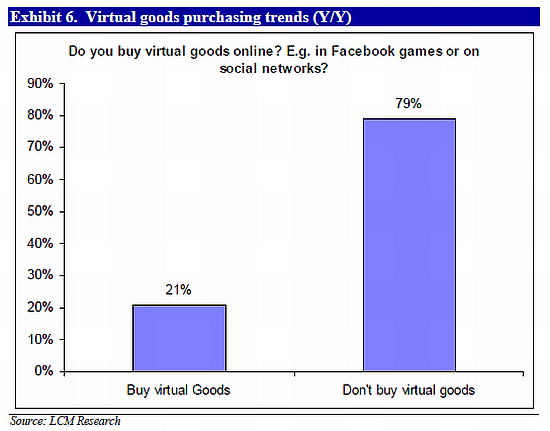分析称社交游戏和传统在线游戏游戏时间比去年有所增长
据Lazard Capital Markets研究的数据称社交游戏和传统在线游戏的玩家游戏时间相比去年有所增长,意味着说之前谣传的在线游戏放缓的事情暂时还没有实现。
Lazard的报告称基于浏览器的传统网页游戏以及社交游戏相比较与掌机游戏更有着强劲的增长预期。特别好的数据是86%的玩家(网页游戏和社交游戏)认为他们同比去年花了更多的时间(或者同等的时间)在游戏上,下图的数据显示,减少游戏时间的玩家仅占14%,游戏时间持平的玩家为66%,而增长游戏时间的玩家则有20%的比例。
这个数据可以和掌机游戏的情况进行对比,掌机游戏认为今年和去年时间持平的在70%,认为会减少游戏时间的占据17%,而会增加游戏时间的仅占13%。
这也意味着说玩家在玩网页和社交游戏的意愿需求上高于掌机游戏。
而在虚拟支付环节上。据Lazard Capital Markets对facebook玩家的追踪数据显示21%的用户选择会进行facebook上游戏虚拟交易或者其他交易的虚拟支付,认为不会进行虚拟交易的用户则依然高达79%。尽管认为会实现虚拟交易的用户比例并不高,但是分析称该比例一直处在持续的增长中,特别是来自zynga和其他社交游戏公司的道具和虚拟支付需求。(本文由游戏邦/gamerboom.com编译)
“Sticky” online games show no sign of slowing down, with current players planning to spend as much — or more — time playing this year as they did last, says a new survey from Lazard Capital Markets. And this applies equally to traditional online titles as well as Facebook games, the analysts say.
“Both traditional browser-based online games as well as social games are showing stronger usage growth as compared with console gaming in our survey,” says Lazard. “Specifically, 86 percent of online gamers plan to spend at least as much or more time playing games online this year. Similarly, 88 percent of social gamers plan to spend as much or more time playing Facebook games this year.”
According to Lazard’s extensive survey, which also covered console gaming trends, the only downside to the online play data was that those identified as infrequent online players plan to play even less frequently this year.
“These trends are also notable given that one of our survey’s sample criteria was video game console ownership, which likely results in some bias toward consoles,” says Lazard’s report. “The trends also suggest a fraying at the edge of core console audience since consumers have a finite amount of time to dedicate to game-play (i.e., time competition). We do not think this will materially impact the core console gaming audience, but it may hinder the growth of console usage among more casually-inclined gamers.”
The online trends are consistent with what Lazard previously observed in the core market — that the active plan to stay that way, but the less-active are seeing attrition.
Lazard also looked at the monetization of social games, particularly those on Facebook — according to the research, 21 percent of Facebook users are buying virtual goods. This is high relative to other reports, a discrepancy Lazard explains by noting it surveyed console owners, creating a sample base of more active gamers from the start.
“Nonetheless, from a trend perspective we note that virtual goods consumption is increasing,” says the report. “We believe this also corroborates the growth of Zynga and other social game publishers, which generate almost all of their revenue from virtual goods transactions on Facebook. ”
Such trends should be taken as good news by console and PC developers too, the report adds, because they suggest a friendliness toward microtransactions in traditional online games.
However, according to Lazard, the area of fastest growth is on mobile devices, thanks to increasing penetration for tablet devices and smartphones. 92 percent of smartphone owners in the analyst survey said they will spend the same or more time playing games on their handheld devices — 33 percent said they expect their time to increase.
Interestingly, while again Lazard’s survey focused on console owners, only half of them reported owning a smartphone. “Given that smartphone unit growth is significantly higher than console unit growth, this suggests to us there is significant headroom for mobile gaming growth,” the report says.
“However, we also note that traditional publishers are likely not generating the profit margins they are historically accustomed to on console platforms, in particular given the rapid price deflation of mobile game apps.”
But Lazard says mobile gaming is likely to complement, not threaten traditional play due to the “significant difference in gameplay and user experience,” according to the report: “We do think they may form part of a broader game ecosystem in which they participate as peripherals.” (source:gamasutra)










































 闽公网安备35020302001549号
闽公网安备35020302001549号